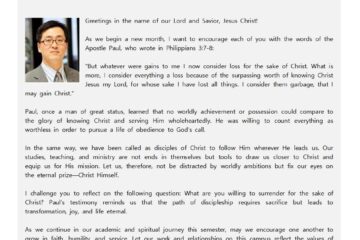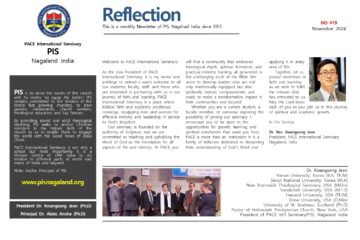 Written by Ron Johnson,
Written by Ron Johnson,
Sydney, Australia
It was in 1989 that our church began the Lay Pastors Ministry after we discovered Dr. Melvin J. Steinbron’s book “Can The Pastor Do it Alone?”. As with most churches, we came up with many questions as the ministry developed and it was an exciting to time to grapple with the questions and find answers to them.
I was the Associate Minister at the time and was entrusted with the task of leading the ministry and answering the questions that arose.
One of the very first questions I needed to put my mind to, came in our Equipping Seminar on the subject of allocating “Flock Members” to our Lay Pastors. One of our prospective new Lay Pastors said enthusiastically “Great, I look forward to sharing the gospel with them!”
This man was a keen evangelist and saw his top priority as evangelizing the lost.
I said to him “Bob, what if the flock assigned to you are all fine Christian people and have wonderful testimonies as to how and when they came to Christ?”
“Well,” said Bob. “I guess I’ll have a good time sharing the Scriptures with them”.
I had to patiently explain that the Lay Pastors Ministry isn’t primarily evangelistic although sometimes it may involve evengelising. It is quite likely that there will be some church members who have not yet understood the gospel with their hearts and minds and been “born again”. Often people initially come to church for a variety of reasons before the message of the gospel sinks in and grabs hold of them.
Bob was keen also to read the Scriptures with his flock members, and that is a fine thing to do if it is appropriate at the time, but what if Bob’s flock members are all keen students of the Bible and regularly attend small Bible study groups?
Bible study groups are an important aspect of the Great Commission.
Both learning the Sciptures and obeying the Scriptures are aspects of “Disciple making”.
Again, I had to explain that the Lay Pastors Ministry is not primarily disciple-making, although sometimes it may involve “disciple making”.
It may be a good thing then to reflect on some definitions of evangelism, disciple-making and pastoral care.
What is “evangelism”? A simple definition:
Evangelism is:
“Sharing the good news of Jesus Christ with a view to“ persuading others to follow Him” (Leighton Ford “Good News Is For Sharing”)
Biblical basis: Jesus said, “Go into all the world and preach the Gospel to all creation. Whoever believes and is baptized will be saved, but whoever does not believe will be condemned.” (Mark 16:15)
A Discipleship definition:
“Discipleship is the process of learning to love and follow Jesus and becoming more like him in our attitudes and actions. It’s also seeking to make other disciples who want to do the same thing.”
(What is Discipleship? — Blog — Groundwork Bible Study)
Biblical basis: Jesus came to them and said,“All authority in heaven and on earth has been given to me.Therefore go and make disciples of all nations,baptizing them in the name of the Father and of the Son and of the Holy Spirit,and teachingthem to obey everything I have commanded you.” (Matthew 28:18-20)
A simple definition from Jesus: “ Teaching the followers of Jesus to obey everything He has commanded us.”
Definitions of Pastoral Care
There are many definitions of pastoral care to be found on the web by both Christian and non Christian organizations that give food for thought,i.e.
Healthcare – “Counseling or comfort given by ministers, priests, rabbis, etc., to those in need of help with emotional problems or stressful situations.” (Sacred Heart Hospital CPE Dept)
Education – “Pastoral care is a term generally applied to the practice of looking after the personal and social wellbeing of children under the care of a teacher.
It can encompass a wide variety of issues including health, social and moral education, behaviour management and emotional support.” www.bexley.gov/uk/service/schools/glossary.html
Lay Pastors Ministry – “Giving one’s self in christian love to a relationship, in times of weakness and in times of strength.” (Mel Steinbron “Can The Pastor Do It Alone?)
I like Dr. Mel’s definition because the Bible gives us many ways in which we can practice giving ourselves to others in times of weakness and strength. For example there are over twenty commands here that we are to follow in relating to one another in love, either in times of weakness or strength:
“Love each other.” John 15:17
“…have equal concern for each other” 1 Cor. 12:25
“Be…compassionate to one another” Eph.4:32
“…forgiving each other” Eph.4:32
“agree with each other” Phil. 4:2
“Bear with each other” Col.3:13
“…encourage each other” 1 Thess.4:18
“build each other up” 1 Thess. 5:11
“Live in peace with each other” 1 Thess.5:13
“be kind to each other” 1 Thess. 5:15
“…confess your sins to each other” James 5:16
“…pray for each other” James 5:16
“Love one another” John 13:34
“Be devoted to one another” Rom.12:10
“Honor one another above yourselves” Rom.12:10
“Rejoice with those who rejoice; mourn with those who mourn” Rom.12:15.
“Live in harmony with one another” Rom.12:16
“Accept one another” Rom.15:7
“…instruct one another” Rom.15:14
“Greet one another with a holy kiss” Rom.16:16
“…serve one another” Gal. 5:13
“Submit to one another” Eph. 5:21
“teach and admonish one another” Col. 3:16
“spur one another on” Heb.10:24
“live in harmony with one another” 1 Peter 3:8
“Offer hospitality to one another” 1 Peter 4:9
“clothe yourselves with humility toward one another” 1 Peter 5:5
“Putting into practice the ‘one another” commands of Scripture” could well be another definiton of pastoral care! Because when they are practiced people will surely be expriencing “Gods love with skin on it”.
By Archdeacon Ron Johnson (retired minister of the Anglican Church of Sydney, Australia, and former Director of the Australian Lay Pastor’s Ministry Network)











